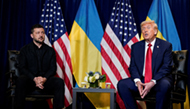For China, Coming-of-Age Party Turns Into Rally for Opponents
PARIS - The journey of the Olympic torch, an event that was supposed to burnish China’s image around the world, has turned into a public relations nightmare not only for China, but also for the nations along the torch’s route.
China has spent eight years and tens of billions of dollars preparing to host the Summer Olympic Games, which Beijing has envisioned as a kind of coming-of-age party to showcase its rapid growth.
But instead the Summer Games and the torch’s journey have served as rallying points for a variety of opponents of the Chinese government, most notably those supporting autonomy or freedom for Tibet.
The torch ceremonies have focused attention on causes that have not been in the spotlight for decades. At the International Campaign for Tibet, telephones have rung continually with calls from news media outlets, politicians and people wanting to sign petitions , said Jan Willem den Besten, the Dutch campaign coordinator.
“What is most dramatic is to see how broad and deep the support has become,” Mr. den Besten said. “You almost have to feel sorry for the Chinese because it’s turned completely against the public image they wanted to present.”
The outbreak of violent unrest in Tibet and an ongoing crackdown there by Chinese security forces has emboldened China’s critics .
A small but growing number of leading political figures in Europe and the United States have called for a boycott of the opening ceremony of the Games.
When the torch reached San Francisco on Wednesday, protests and vigils had been taking place for days. The city was chosen as the only stop in North America because of its large Asian population.
The Archbishop Desmond Tutu spoke to several thousand people at a candlelight vigil near City Hall on the eve of the torch’s arrival and called on President Bush to boycott the opening ceremony of the Games, which begin in August.
“To all the leaders of the world,” the Reverend Tutu said, “for goodness sake, don’t go to Beijing.
In London on Sunday, the relay turned into a tumult of scuffles and dozens of arrests.
And what was supposed to be a majestic procession through Paris resulted in waves of chaos last Monday, as human rights groups used the event to assail China’s record and make the Games an increasingly delicate political challenge for the ruling Communist Party.
At the Trocadero opposite the Eiffel Tower, human rights organizations like Amnesty International and press freedom groups like Reporters Without Borders protested side by side with representatives of a banned underground Chinese democracy party, Taiwan nationalists and proponents of independence for the Uighurs, a Muslim minority in western China.
“We all have the same problem,” Can Asgar, a leader of the Uighur diaspora in Munich, yelled into a microphone at the Trocadero.“Freedom for Uighurs. Freedom for Tibet. We must fight together.”
In Beijing last Monday, a spokeswoman for the city’s Olympic organizing committee, speaking before the disruptions in France, vowed that the relay would continue on its international route. “The torch represents the Olympic spirit, and people welcome the torch,” said Wang Hui, the spokeswoman. “The general public is very angry at this sabotage by a few separatists.”
Meanwhile, Jacques Rogge, the chairman of the International Olympic Committee, used a meeting of national Olympic Committee representatives in Beijing to criticize the London protests, but also to call for a rapid and peaceful solution to the confrontations in Tibet. He rejected the idea of boycotting the Games.
The Olympic flame began its trek from Ancient Olympia in Greece to Beijing on March 24, and was the focus of protests right from the start. The torch is now scheduled to travel to a dozen other countries before arriving in China on May 4.
In an interview on the VRT television network in his native Belgium, Mr. Rogge warned that pushing China too hard on Tibet and human rights would be counterproductive.
“If you know China, you know that mounting the barricades and using tough language will have the opposite effect,” he said. “China will close itself off from the rest of the world, which, don’t forget it, it has done for some 2,000 years.”
스마터리빙
more [ 건강]
[ 건강]이제 혈관 건강도 챙기자!
[현대해운]우리 눈에 보이지 않기 때문에 혈관 건강을 챙기는 것은 결코 쉽지 않은데요. 여러분은 혈관 건강을 유지하기 위해 어떤 노력을 하시나요?
 [ 건강]
[ 건강]내 몸이 건강해지는 과일궁합
 [ 라이프]
[ 라이프]벌레야 물럿거라! 천연 해충제 만들기
 [ 건강]
[ 건강]혈압 낮추는데 좋은 식품
[현대해운]혈관 건강은 주로 노화가 진행되면서 지켜야 할 문제라고 인식되어 왔습니다. 최근 생활 패턴과 식생활의 변화로 혈관의 노화 진행이 빨라지고
사람·사람들
more많이 본 기사
- 트럼프 “소말릴란드 아는 사람 있나?”…이스라엘 승인에 ‘NO’
- 韓정부, 노란봉투법 해석 지침 공개… 하청 임금·근로조건 좌우하면 ‘진짜 사장’
- 특검, 尹에 징역 10년 구형… “법치주의·사법질서 파괴”
- 한파에 고드름이 주렁주렁… 서울 이번 겨울 첫 한파주의보
- 황하나, 마약 도피 중 캄보디아서 출… 1
- ‘서해 공무원 피격 은폐’ 혐의 서훈… 2
- “아동 수출국 오명 벗는다” 70년 만에 해외입양 중단
- ‘정보 유출자 셀프 조사’ 경찰에 늦게 알린 쿠팡… 증거인멸 의혹
- “올해 최고 주목받은 테크 거물은 머스크 아닌 래리 엘리슨”
- 오바마케어 가입자수 감소
- ‘김건희에 로저비비에 선물’ 김기현 부인 특검 재출석…곧 기소
- 찰스 3세, 내년 방미 추진…트럼프에 英왕실 ‘매력 공세’될까
- 이혁재가 또.. “빌려간 3억원 안 갚아” 사기 혐의로 피소
- LA 등 서부에 사흘째 폭우…동부엔 폭설 예보
- 맘다니 취임위원회에 ‘파친코’ 이민진 작가 위촉
- 쏟아지는 갑질·특혜 의혹… 버티는 김병기, 속 끓는 정청래
- 소싯적 ‘치기어린’ 주소 “굿바이”…지메일 주소변경기능 도입
- 조지아 역주행 사고, 한인남편 이어 임신 아내도 사망
- “출생시민권은 사기”⋯ 이민 2세대 공격 초점 맞춘 트럼프
- 러, 트럼프-젤렌스키 종전회담 직전 … 1
- VA·MD 7명 생굴 먹고 식중독…22개주 60여명 감염
- 린다 한 “내년 1월17일 별도 한인회연합회 만들겠다”
- 뉴욕·뉴저지 연말 대대적 음주운전 단속
- ‘역대 최연소’ 백악관 대변인 레빗,… 1
- ‘NCT 탈퇴’ 태일, 성폭행 혐의로 결국 감옥行..징역 3년 6개월 확정
- 특검, 김건희 ‘금품 수수’ 무더기 기소… 뇌물 여부는 경찰 몫으로
- 곽도원, 음주운전 3년 만 복귀각..스토리제이컴퍼니 측 “미팅 했지만 계약 단계 아냐”
- [이지 사이언스] “온난화 막으려면 세계인구 44% 식단 바꿔야…문제는 소고기”
- ‘손흥민 감격의 첫 우승’ 올해 축구계 기적 톱8 선정 ‘선수로는 유일’
- 미국, 美방산기업 제재한 中에 “대만 무기판매 보복 강력반대”
- ICE 버지니아 구금시설 ‘포화’…수감자 역대최고
- 작년 운용자산 5조5천억달러…갑부들의 ‘패밀리오피스’ 월가 새 강자로
- ‘학자금 상환’ 안하면 임금압류
- 가지마오 세월님
- 김정은, 핵잠 이어 미사일 공장도 시… 1
- 국제은값 폭등에 개인투자자들 銀투자 대거 유입
- “영원한 생명 주실 승리의 하느님 오신 날”
- 물류거점창고에 불체자 8만명 수용 추진
- 대만이슈 돌출로 美中 ‘삐걱’…내년 4월 트럼프 방중前 기싸움?
- ‘마약 혐의’ 남양유업 3세 황하나 구속… “증거인멸 우려”
- 트럼프 압박에 굴복 UVA 총장 선출 강행
- “연말은 스트레스·새해 결심은 없다”
- 탑여행사 추천 여행지-도시 자체가 박물관인‘피렌체’
- “새해 1호 법안은 2차특검” 정청래, 강경 기조 그대로
- 與 ‘통일교·신천지 특검법’ 발의… 野 “뜬금없다”
- “엔비디아, AI칩 스타트업 인수 아닌 기술 계약으로 규제 회피”
- 8시즌 뛰고 ML 역대 17위 “오타니 GOAT 될 것”, ML 역대 50인 선정
- 젤렌스키 “28일 트럼프와 종전안 논의…영토·원전 외 90% 완성”
- 뉴욕한인회, 이번에 이사장 자리 놓고 내홍 조짐
- 효연, 소녀시대 수입 서열 공개 “1위 나 아냐..윤아·태연이 더 벌어”
1/5지식톡

-
 미 육군 사관학교 West Poin…
0
미 육군 사관학교 West Poin…
0https://youtu.be/SxD8cEhNV6Q연락처:wpkapca@gmail.comJohn Choi: 714-716-6414West Point 합격증을 받으셨나요?미 육군사관학교 West Point 학부모 모…
-
 ☝️해외에서도 가능한 한국어 선생님…
0
☝️해외에서도 가능한 한국어 선생님…
0이 영상 하나면 충분합니다!♥️상담신청문의♥️☝️ 문의 폭주로 '선착순 상담'만 진행합니다.☎️ : 02-6213-9094✨카카오톡ID : @GOODEDU77 (@골뱅이 꼭 붙여주셔야합니다…
-
 테슬라 자동차 시트커버 장착
0
테슬라 자동차 시트커버 장착
0테슬라 시트커버, 사놓고 아직 못 씌우셨죠?장착이 생각보다 쉽지 않습니다.20년 경력 전문가에게 맡기세요 — 깔끔하고 딱 맞게 장착해드립니다!장착비용:앞좌석: $40뒷좌석: $60앞·뒷좌석 …
-
 식당용 부탄가스
0
식당용 부탄가스
0식당용 부탄가스 홀세일 합니다 로스앤젤레스 다운타운 픽업 가능 안녕 하세요?강아지 & 고양이 모든 애완동물 / 반려동물 식품 & 모든 애완동물/반려동물 관련 제품들 전문적으로 홀세일/취급하는 회사 입니다 100% …
-
 ACSL 국제 컴퓨터 과학 대회, …
0
ACSL 국제 컴퓨터 과학 대회, …
0웹사이트 : www.eduspot.co.kr 카카오톡 상담하기 : https://pf.kakao.com/_BEQWxb블로그 : https://blog.naver.com/eduspotmain안녕하세요, 에듀스팟입니다…
케이타운 1번가
오피니언

새해 더 중요해지는 노동법 준수

연말연시, 안전하고 차분하게
 캐슬린 파커 워싱턴포스트 칼럼니스트
캐슬린 파커 워싱턴포스트 칼럼니스트 [캐슬린 파커 칼럼] 지미 라이의 마지막 희망
 유경재 나성북부교회 담임목사
유경재 나성북부교회 담임목사 [한국춘추] 미국의 힘
 전병두 서북미수필가협회 회원
전병두 서북미수필가협회 회원 [금요단상] 비자 발급
 박일근 / 한국일보 수석논설위원
박일근 / 한국일보 수석논설위원 [지평선] 스님의 주례사
 신상철 / 고려대 고고미술사학과 교수
신상철 / 고려대 고고미술사학과 교수 [미술 다시보기] 신의 모습을 닮고자 한 예술가
 스티브 강 전 한인민주당협회 회장
스티브 강 전 한인민주당협회 회장 [스티브 강 ‘인사이드 미국’] 2026 중간선거: 트럼프 지지율 하락이 말해주는 것
 김홍일 케이유니콘인베스트먼트 대표
김홍일 케이유니콘인베스트먼트 대표 [기고] 안정의 기준은 어떻게 제도가 되었나
1/3지사별 뉴스

물류거점창고에 불체자 8만명 수용 추진
도널드 트럼프 행정부가 이민자 구금·추방을 효율화하기 위해 전국 물류거점 창고에 8만명 규모의 수용시설 확보를 추진한다고 24일 워싱턴 포스트…
‘학자금 상환’ 안하면 임금압류

“온 세상에 희망·평화의 빛 스며들길”
가자지구와 우크라이나에서의 전쟁, 고립과 불평등으로 세상이 어지러운 가운데 워싱턴 지역 각급 한인교회와 성당들이 성탄절을 맞아 일제히 예배와 …
“연말은 스트레스·새해 결심은 없다”

‘손흥민 vs 메시’ 2026 MLS 개막전서 세기의 맞대결 예고
LA 풋볼클럽(LAFC)가 2026시즌 MLS 정규리그 일정을 공식 발표하며 한인 축구 팬들의 시선을 한몸에 받고 있다. LAFC는 오는 20…
[새해부터 이렇게 달라진다] 최저임금 또 오르고… 유급 병가는 더 확대

오늘 하루 이 창 열지 않음 닫기 





















































.png)


댓글 안에 당신의 성숙함도 담아 주세요.
'오늘의 한마디'는 기사에 대하여 자신의 생각을 말하고 남의 생각을 들으며 서로 다양한 의견을 나누는 공간입니다. 그러나 간혹 불건전한 내용을 올리시는 분들이 계셔서 건전한 인터넷문화 정착을 위해 아래와 같은 운영원칙을 적용합니다.
자체 모니터링을 통해 아래에 해당하는 내용이 포함된 댓글이 발견되면 예고없이 삭제 조치를 하겠습니다.
불건전한 댓글을 올리거나, 이름에 비속어 및 상대방의 불쾌감을 주는 단어를 사용, 유명인 또는 특정 일반인을 사칭하는 경우 이용에 대한 차단 제재를 받을 수 있습니다. 차단될 경우, 일주일간 댓글을 달수 없게 됩니다.
명예훼손, 개인정보 유출, 욕설 등 법률에 위반되는 댓글은 관계 법령에 의거 민형사상 처벌을 받을 수 있으니 이용에 주의를 부탁드립니다.
Close
x